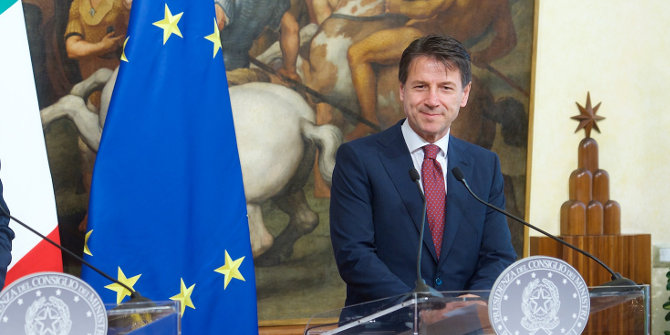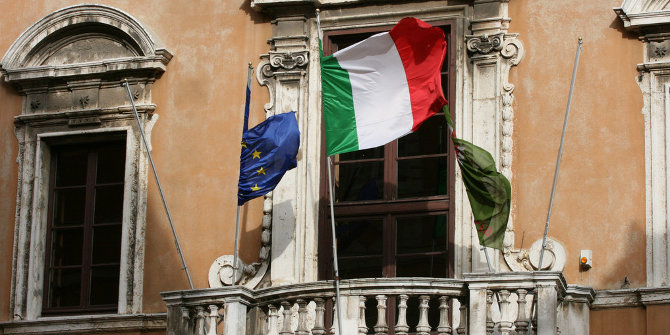 With Catalan elections scheduled for 21 December, the fate of Carles Puigdemont, who fled to Belgium in October, has taken on added significance. The latest twist in the case came on 5 December, when the Spanish authorities revoked a European Arrest Warrant for Puigdemont, amid suggestions he was intending to voluntarily return to Spain. Auke Willems explains the most recent developments, writing that while the Belgian courts, European law, and possibly the EU’s institutions have been given a reprieve from becoming involved in the crisis, the matter remains unresolved as the national arrest warrant against Puigdemont is still in place.
With Catalan elections scheduled for 21 December, the fate of Carles Puigdemont, who fled to Belgium in October, has taken on added significance. The latest twist in the case came on 5 December, when the Spanish authorities revoked a European Arrest Warrant for Puigdemont, amid suggestions he was intending to voluntarily return to Spain. Auke Willems explains the most recent developments, writing that while the Belgian courts, European law, and possibly the EU’s institutions have been given a reprieve from becoming involved in the crisis, the matter remains unresolved as the national arrest warrant against Puigdemont is still in place.

Credit: OK Apartment (CC BY 2.0)
On 5 December, Spain revoked a European Arrest Warrant (though a national arrest warrant remains in place) for ousted Catalan President Carles Puigdemont, who fled to Belgium in October. The development came following reports that Puigdemont was willing to return voluntarily to Spain, and a hearing in a Belgian court where the defence raised grounds that might have sufficiently scared Spanish authorities. This development has ensured that a further hearing in a Belgian court scheduled for the following week, in which a decision was expected, became moot.
A few weeks ago, I wrote that the case had brought EU law into the debate over the constitutional turmoil generated by Catalonia’s push for independence, and by the Spanish government’s violent refusal to allow a referendum. Given the rapid unfolding of events since, an update to this analysis is now warranted.
As I wrote in my original piece, there were some sound reasons for Puigdemont to choose Belgium when he opted to leave Catalonia, most notably the country’s extradition history with Spain. There are a number of important cases involving alleged ETA terrorists which have relevance, most recently the case of Jauregui Espina, an ETA suspect who had been on the run for 32 years and was living in Belgium.
The Belgian courts refused his surrender to Spain, primarily because of the risk that he would face inhumane and degrading treatment, as the defence submitted reports that showed deplorable conditions under which ETA suspects were detained. The Belgian court of appeal held that there is no presumption that Spain is fully fundamental rights compliant: a bold decision, breaking with the presumption of mutual trust that lies at the heart of the European Arrest Warrant and Europe’s broader criminal justice project.
Nevertheless, as I also noted, it would have been difficult for the Belgian court to refuse extradition in the case of Puigdemont, and the situation was likely to put pressure on bilateral relations and the wider system of European criminal justice cooperation. These observations remain valid and all of these factors have in some way played into the current state of affairs. However, following the pace of developments in this saga, a brief add-on is needed.
It appears that all parties involved in a sense ‘caved’, i.e. gave in to pressures that might have resulted in a situation where all sides would have become ‘losers’: Belgium being ‘forced’ to (partially) extradite, Puigdemont being extradited, and Spain being able to charge him only for ‘lesser crimes’.
If it is correct that Puigdemont is willing to return to Spain, this is in contradiction with his earlier stance to fight extradition and challenge the fairness of proceedings in Spain. He might have anticipated his impending extradition, but also the significant time this could take (following possible appeals). He would be bound to stay in Belgium, not able to participate in the upcoming elections in Catalonia scheduled for 21 December, and even if his extradition would have been refused, what was his end game, to remain in Belgium forever?
As to the Belgian Court, at the 4 December hearing it anticipated that for some of the crimes charged the so-called ‘double criminality’ requirement was missing, which requires that for a crime to be extraditable it must be criminalised in both jurisdictions. While a major innovation of the European Arrest Warrant has been to abolish this key rule of extradition law, it has only done so for a list of 32 crimes, leaving Member States the option to require dual criminality for other crimes. This could have led to a situation where the request for extradition would have been partially granted, so on the basis of some crimes, but not all. If he was extradited solely on the grounds of ‘misuse of public funds’, and not ‘rebellion’, a much more serious crime, it would have significantly tied the hands of Spanish prosecutors.
This brings us to the reasons why Spain revoked the European Arrest Warrant. It could mean that Puigdemont could only be tried for the crimes deemed extraditable according to Belgium, and not the full charge. Taken together with ‘signals’ that Puigdemont is willing to return, it revoked its European Arrest Warrant altogether, in the hope that when he returns he can be arrested and charged with the full set of crimes, not some diluted version thereof.
For the time being, Puigdemont has signalled that he will stay where he is, and the first round appears to be for him and his lawyer. The hearing in Brussels on 4 December, where they raised the dual criminality grounds, and where the court indicated it may follow these, connected with his stated ‘intention’ to return to Spain, have resulted in Spanish authorities revoking the European Arrest Warrant. However, this situation could rapidly change again if Spanish authorities do get a hold of him as they will be able to charge him with the full range of crimes in the national arrest warrant that remains in place. And pressure from within Catalonia is growing for its leader to return to participate in the upcoming elections.
So, the stakes remain as high as they were, and the matter is as unresolved as it was. However, the Belgian courts, European law, and possibly the EU’s institutions have been given a break, which they will all surely welcome.
Please read our comments policy before commenting.
Note: This article gives the views of the author, not the position of EUROPP – European Politics and Policy or the London School of Economics.
_________________________________
 Auke Willems – LSE
Auke Willems – LSE
Auke Willems is a Fellow in EU Law at the LSE’s European Institute.






Thanks for this piece which improves on the earlier one. However, the relevant factor from the Spanish side is not mentioned here, and is the decision and official announcement by PdCat (Puigdemont’s party, which was leading the catalan government until its dissolution under art 155 earlier in October) to advance Puigdemont as its candidate to the presidency of the new catalan government (following his own personal request) for the elections that will take place on 21 december.
This effectively means that Puigdemont will surely be re-elected to the catalan parliament and will have to travel to Spain to take possession. As soon as the judge in the supreme court found out – literally hours afterwards – he duly revoked the European Arrest Warrant as he had not choice but to do. So, contrary to what this article suggests, Spain’s Supreme court is not playing political games, just effectively applying its legal provisions to the changing circumstances of the case.
I would like to complete your piece with some additional information:
– You are right that in the case Jauregui Espina, in which the execution of the EAW was refused because “is no presumption that Spain is fully fundamental rights compliant”. But a very relevant point is that it was decided by a Netherlandse Chamber of the Belgium Courts.
– By contrast, on 26 Mai 2004, the Cour de Cassation (Chambre francophone) granted the execution of the EAW concluding that it did not exist any reason to believe the fundamental rights of the requested person were not going to be respected. On of the surrendered was a member of ETA, already sentenced for the assessination of the leader of the Socialist Party in the Basque Country.
– It seems that Puidgemont’ lawyers designed his strategy taking into account this discrepancy between the two “linguistic” Chambers of the Belgium Courts (an evident forum shopping?). Puigdemont speaks a good French but he chose the Netherlandse Courts.
– The refusal of the enforcement of the EAW has been challenged before the ECHR by the family of the allegedly victims of Jauregui Espina. The case is still pending:
https://hudoc.echr.coe.int/eng#{“respondent”:[“BEL”],”documentcollectionid2″:[“COMMUNICATEDCASES”],”itemid”:[“001-176044”]}